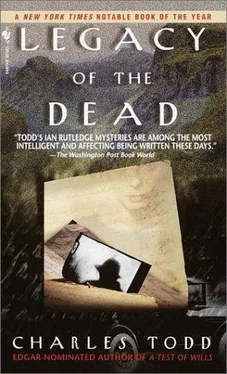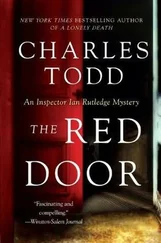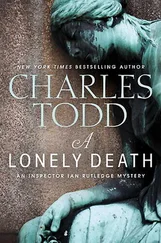Charles Todd - Legacy of the Dead
Здесь есть возможность читать онлайн «Charles Todd - Legacy of the Dead» весь текст электронной книги совершенно бесплатно (целиком полную версию без сокращений). В некоторых случаях можно слушать аудио, скачать через торрент в формате fb2 и присутствует краткое содержание. Жанр: Полицейский детектив, на английском языке. Описание произведения, (предисловие) а так же отзывы посетителей доступны на портале библиотеки ЛибКат.
- Название:Legacy of the Dead
- Автор:
- Жанр:
- Год:неизвестен
- ISBN:нет данных
- Рейтинг книги:5 / 5. Голосов: 1
-
Избранное:Добавить в избранное
- Отзывы:
-
Ваша оценка:
- 100
- 1
- 2
- 3
- 4
- 5
Legacy of the Dead: краткое содержание, описание и аннотация
Предлагаем к чтению аннотацию, описание, краткое содержание или предисловие (зависит от того, что написал сам автор книги «Legacy of the Dead»). Если вы не нашли необходимую информацию о книге — напишите в комментариях, мы постараемся отыскать её.
Legacy of the Dead — читать онлайн бесплатно полную книгу (весь текст) целиком
Ниже представлен текст книги, разбитый по страницам. Система сохранения места последней прочитанной страницы, позволяет с удобством читать онлайн бесплатно книгу «Legacy of the Dead», без необходимости каждый раз заново искать на чём Вы остановились. Поставьте закладку, и сможете в любой момент перейти на страницу, на которой закончили чтение.
Интервал:
Закладка:
McKinstry said, “Not until dinnertime, so I’m told, sir. The Inspector said he was attending to a private matter.” Or tactfully out of sight. “Would you like me to take you to the Chief Constable instead?” He looked down at his coveralls and grinned. “As soon as I change out of these.”
“No, I’ll speak to Oliver first. In the meantime, I’d like to hear something about the town and the people here. You’ve given me a fairly comprehensive picture, but now I need more.”
“I was just having my tea, and I’d be honored to have you join me.”
Over tea and a lemon cream cake that had come from the baker’s, McKinstry chose his words with great care, trying to see Duncarrick through a stranger’s eyes.
“You’d call it provincial, coming from London. We don’t have broad horizons. But most people have known each other all their lives, depended on each other in hard times, seen each other through the worst and the best that happens to them. Weddings. Funerals.” He passed Rutledge a wedge of the cake on a delicate china plate. “If I fell ill tomorrow, I’d have the neighbors bringing me tea and soups and fresh bread. My washing would be done, clean sheets for the bed, someone would think to bring me a few flowers-a book to read. And not because I’m the constable. It’s our way.”
He cut himself a slice of lemon cake, savored it, then said, “Sorry, I don’t have any sandwiches-”
“No, this is enough,” Rutledge said. “Carry on.”
Hamish had been listening, commenting on the examples McKinstry had given, agreeing with most of them. “In my experience, it would be the lassies, with the flowers! Hoping to be noticed.”
“But there’s the other side of the coin too, sir. We’re a rigid lot when it comes to sin. It’s black and white, no gray in between. We can be small-minded. We know each other’s business. That’s a help to me, as I told you at Mr. Trevor’s house. I can guess who’s chasing the Youngs’ cat or borrowing Tim Croser’s horse when he’s drunk and not likely to notice. That would be Bruce Hall, who is courting a lass between here and Jedburgh, and hates walking when he can ride. But his pa won’t give him the loan of a horse because he doesn’t approve of the girl.”
“And yet you can’t put your finger on the author of these letters.”
McKinstry frowned and set down his cup.
“And that’s what I find most disturbing,” he said, considering it. “Why can’t I go and knock on a door and see guilt written in the face answering it? I walk down the street on my rounds, and I look into the eyes of the people I meet. I stand and talk to them for a time. I watch them go about their daily business. And there’s nothing about them that I can put my finger on and say, ‘Now, that’s the action of a guilty woman.’ ”
“Why are you so certain it’s a woman?”
“Because why would a man think to warn a laundress that her soul was in danger, washing a whore’s sheets? Or warn a young mother that her small daughter had a bastard for a playmate and was likely to see goings-on at the inn that weren’t fit for an innocent child’s eyes?”
Hamish was already there, but Rutledge set aside his plate and finished his tea before saying, “A man might write such things to throw you off the scent. Or he may recognize that it’s the women in Duncarrick who form public opinion-”
McKinstry’s face darkened. “Then he’s a bloody coward. Begging your pardon, sir!”
Rutledge asked for a chronology of the case, and McKinstry painstakingly gave it to him, this time leaving out nothing that he considered important. Rutledge paid close attention, noting facts as well as listening for nuances. When McKinstry had finished, he said, “Well done.” Hamish, silent in his head, stirred uneasily. Rutledge found his thoughts straying for an instant, then went on.
“My guess is that whoever wrote such letters knew they’d be believed. And that’s the next point. Why would people so readily believe them? Why didn’t the first person to find one on his doorstep march straight to the police or to the accused and make it clear that this wasn’t going to continue?”
McKinstry took a long breath. “You are asking me to answer you that she’s guilty. The accused. Where there’s smoke, there’s fire, they say. But I’m not prepared to believe that. I’d rather believe that the letter-writer chose her- his-targets very carefully. Some people relish gossip if it’s shocking enough.”
“Will you make a list of all the people who have admitted to receiving these letters? What they do for a living. What reason they might have had for disliking the accused. How well they might have known her.”
“Yes, sir, I’ll do that today. But, begging your pardon, sir, I don’t see how that will help you find out the truth about the bones said to be Lady Maude Gray’s daughter’s.” He shook his head. “And that’s another whole kettle of fish.”
“It is,” Rutledge agreed. “But in my experience, where coincidence dovetails so perfectly, it becomes suspect. First we have these letters, apparently accepted as truthful. And now you tell me there was another one, from here-or from Glasgow, depending on how reliable the postmark may be- only this anonymous writer stoutly defends the accused, and in so doing puts her in even greater jeopardy. A charge of murder, not mere wantonness. There’s a search of the inn-where a body turned up. Only it isn’t the boy’s mother. Now, who knew enough about the history of The Reivers that he or she sent Inspector Oliver on such a wild-goose chase? But it does whet Oliver’s appetite for the hunt, and he begins to search for missing persons. The upshot of that is a set of unidentified bones and a connection with a woman in England whose daughter has not been seen since 1916. Now we have larger questions to answer than who wrote the letters. I wonder, was someone counting on just that?”
There was confusion in McKinstry’s eyes. “I don’t follow you, sir.”
But Hamish did. He said, “Is the woman in yon cell a murderer-a victim-or a scapegoat?”
As Rutledge took his leave, McKinstry said, “The worrisome thing in all of this-to my way of thinking-is that no one has lifted a hand for Fiona. No one has spoken up for her. Not Mr. Elliot, not Mr. Robson, not Mr. Burns-the fiscal. Not Inspector Oliver. It’s as if she’s been found guilty already, and the trial’s a travesty that’ll put a stamp on it for the world to see: We were right in what we did. A jury has said as much. And the truth will be buried with her. That keeps me awake at night.” He ticked the words off on his right hand. “Minister, Chief Constable, procurator-fiscal, policeman. And what if she’s innocent and they hang her?”
Walking back to his motorcar at the hotel, Rutledge went over again the information McKinstry had laid out for him. What intrigued him was how skillfully balanced each scrap of the puzzle seemed to be.
Like a game of chess, where the player knows in advance the moves of each piece on the board. In chess there were two players. Attack and counterattack. In life, there would be no certainties about the outcome…
Before Rutledge left the house, the constable had taken out a copy he had made of the letter that had been addressed to Mr. Elliot, the minister. He read it aloud. As Rutledge listened, he found himself thinking that Elliot would have been better advised to go directly to the woman herself and ask for some explanation. Instead he’d chosen to involve the police, indicating that he had already half believed the malicious accusations brought to him by his parishioners. That would be worth exploring…
Taking the copy from McKinstry, Rutledge had scanned it. It was untutored, apparently the work of a woman who earnestly tried to defend-and instead unwittingly pointed a finger of guilt. If it was a hoax, it was very cleverly devised. There was a ring of sincerity in the simple wording.
Читать дальшеИнтервал:
Закладка:
Похожие книги на «Legacy of the Dead»
Представляем Вашему вниманию похожие книги на «Legacy of the Dead» списком для выбора. Мы отобрали схожую по названию и смыслу литературу в надежде предоставить читателям больше вариантов отыскать новые, интересные, ещё непрочитанные произведения.
Обсуждение, отзывы о книге «Legacy of the Dead» и просто собственные мнения читателей. Оставьте ваши комментарии, напишите, что Вы думаете о произведении, его смысле или главных героях. Укажите что конкретно понравилось, а что нет, и почему Вы так считаете.












